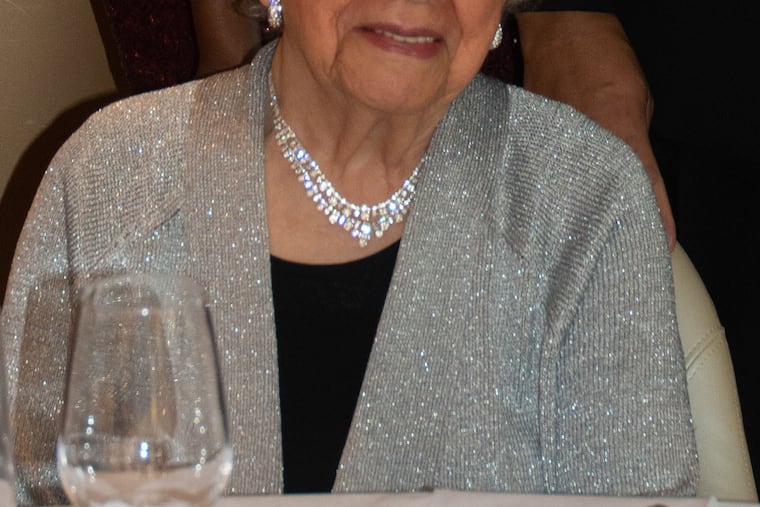My husband’s aunt is nearly 100, and she’s still teaching us so much | Jenice Armstrong
I enjoyed the sunny beaches and the various ports we visited on our vacation. But one of my favorite memories is the afternoon my husband and I spent in his 99-year-old aunt's stateroom interviewing her for this column.

Readers regularly ask me to interview seniors on the cusp of becoming centenarians.
Most times, I respectfully decline.
But I made an exception for my husband’s remarkable aunt Joyce Turner, who is 99 years young. Not only is she still mentally sharp and in good health, but she researches and writes scholarly articles. Turner also is active on her retirement community’s diversity committee.
» READ MORE: For our columnist, NAACP is all in the family
Recently, she organized and led an 11-day family Caribbean cruise on Holland America that concluded Sunday.
I enjoyed the sunny beaches and the various ports we visited.
But one of my favorite memories is the afternoon my husband and I spent in Turner’s stateroom interviewing her for this column.
She’s a walking black-history book.
Turner gets it from her father, Richard B. Moore, who moved to the United States from Barbados in 1909 when he was 15. Even though he had been trained to do office work, Moore was unable to find a suitable job because of his skin color.
» READ MORE: We don’t spend enough time eating together and actually listening to each other | Jenice Armstrong
He became an activist for the rights of blacks throughout the African diaspora. In 1942, he opened the Frederick Douglass Book Center in Harlem, a gathering place for other Caribbean activists and also black literary figures such as Langston Hughes and Claude McKay.
Turner, who wrote a book about her father, Richard B. Moore, Caribbean Militant in Harlem: Collected Writings, 1920-1972 (Blacks in the Diaspora), was born in August 1920. Times were particularly hard. The Great Migration was underway as African Americans fled the Jim Crow South in search of better conditions, only to encounter racism in their new homes.
Raised in Harlem, Turner recalled teachers lining students up from the lightest to the darkest — something that would later rankle her.
After graduating in 1941 from Hunter College with a degree in chemistry, she married the late W. Burghardt Turner. They met when he was raising money to attend Columbia University by selling milk door to door. His father, Frank M. Turner, worked closely with the noted sociologist and civil rights activist W.E. Burghardt Du Bois, a founder of the NAACP, and was the organization’s longtime bookkeeper and accountant.
Turner recalled traveling to visit her new husband at a military post when he was stationed in Virginia and encountering a segregated railroad car for the first time.
“There were seats, but they were more like benches. I walked to the front and there was no place to sit. I walked to the back and there was no place to sit. I heard a woman say, ‘Poor thing. She’s in the wrong car.’ So, I got off and walked in [the white car] and got a seat,” recalled Turner, who has a light complexion. “I sat in there with my book. And they’re talking about the n—s all the way.”
The day our cruise ship docked in Barbados, Turner disembarked so she could meet with the head of the Barbados Museum and Historical Society and the ambassador to Caricom, an organization of Caribbean nations. Back on board, Turner reflected on being in Barbados in 1966 for its independence celebration, and watching as the British flag was lowered and a new one raised.
“I had the distinction of going to the first session of Parliament with my father. My two memories were silly. One is that I was the only woman with no hat,” she said. “The other is that the new prime minister wore what we would call a guayabera [shirt]. Previously, Parliament met with a black robe and a wig.”
The afternoon I spent interviewing Turner flew by. There was so much we didn’t get to — her life in Patchogue, N.Y., and her involvement with the founding of the NAACP chapter there. Her years spent in education and public health. A mother of three, Turner has five grandchildren and six great-grandchildren, with more on the way. I decided to wrap things up by asking her to share some advice for aging well.
“It’s very important to be involved in something that you’re really interested in,” she told me. “To me, it’s sad if you have nothing really to do.”
Turner talked about a senior she knows who chooses to dine alone. “That is not the way to spend the last years of your life,” she said.
Later at dinner, when we raised our glasses for a celebratory toast, Turner held hers high, proving she not only gives good advice but follows it too.